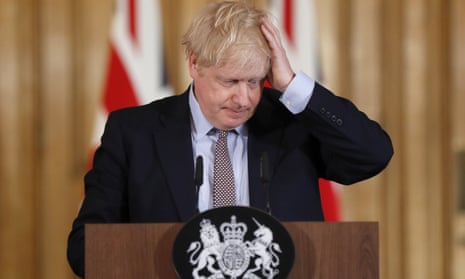When the weather changes in politics, it changes fast. It’s only a few weeks since Brexit was the biggest peacetime challenge in a generation, a task so huge many wondered if Boris Johnson could pull it off, but now it’s no longer even the most pressing problem on his list.
As of this week, his government is at war not only with coronavirus but with some of its own civil servants; the BBC; swaths of businesses opposed to Brexit; and possibly soon the judiciary, depending on the outcome of a review led by the new attorney general, Suella Braverman. All while trying to deliver a trade deal with Europe on a timetable that many in Brussels already thought was impossible. Get either the first or the last of those wrong, and the worst-case scenario is a 2008-style economic crash, not to mention the potential loss of life in a pandemic. Get both of them wrong, and the consequences don’t bear thinking about.
But that’s not all. In the spare time it no longer has, Johnson’s government is trying to plan for reducing carbon emissions to net zero – arguably a big enough project to dominate a parliament all by itself in normal times, and one which would be taking a chunk out of GDP even if everything else was going swimmingly – while simultaneously closing a gap between north and south that has built up over decades. Thanks to Downing Street’s kneecapping of the former chancellor Sajid Javid, a budget supposed to encompass all this is being rewritten at speed by his successor, Rishi Sunak, who may be a rising star but has been in government for only two years and in post for less than three weeks.
The downsides of being led by people who will cross the road to pick an unnecessary fight should be obvious now even to Downing Street’s lords of creative destruction, but just to spell it out: government is hard enough as it is without starting fires for the sake of it. Now those in the Johnson camp who scoffed at Theresa May for failing to get anything much done beyond Brexit are about to find out that there are only so many fronts on which a government can fight. Just as the NHS or the police service will have to make difficult choices in a pandemic, concentrating on the most urgent priorities, something will surely have to give in government too.
The first obvious casualty is Downing Street’s hopes of getting big, bold and potentially controversial economic reforms through while it’s still riding high from a general election victory. Next week’s budget is expected to see radical ideas shelved in favour of measures to support the economy through a potentially serious outbreak of the virus, and while officially the line is that the government could just delay the big decisions to autumn, if Brexit talks are by then down to the wire then public appetite for more economic shocks will be limited. If a pandemic that could last for months does end up choking off economic growth, however temporarily, big question marks hover over the spending promises that helped bring Johnson to power. Where is the money going to come from?
Second, environmentalists should be braced for growing opposition to the net zero target if an economic downturn follows. Many natural Conservative supporters were never wholly convinced by the argument. If the economy falters under the combined weight of Brexit plus up to a fifth of the workforce going down sick, then expect to hear arguments that Britain can’t afford to hamstring itself any further at a time like this getting louder. The target of decarbonising the economy by 2050 is hard to duck, given that it’s enshrined in law and in the Conservative manifesto, and some bold early decisions have been taken. But becoming a world leader in tackling the climate crisis isn’t critical to Johnson’s political project of keeping “red wall” voters who have defected to the Tories happy, and that makes it potentially vulnerable.
Third, the way Brexit negotiators respond to what looks like the coming storm is crucial. For the next few months EU leaders will have their hands full dealing with coronavirus and its economic consequences, as well as what looks like a resurgence of an immigration crisis on its borders after Turkey announced it can no longer absorb refugees fleeing Syria; they’re likely to have less time, patience and political capital to spare for Britain’s self-inflicted neuroses over Brexit. But EU leaders may also be more anxious than they would have been about the risks of an uncontrolled and disorderly exit creating disruption across the continent, if the pandemic starts tipping some member states into recession. The sane outcome would be a far stronger will on both sides of the Channel to agree a deal, but that will take hitherto unseen reserves of maturity on both sides, plus a willingness to compromise rather than play to the gallery.
Things could be worse, obviously; to see how much worse, check out the footage of Donald Trump’s televised meeting with pharmaceutical companies, during which the president is patiently led through some extraordinarily basic questions about how vaccines work and how long clinical trials take.
But for all our sakes, the prime minister’s intervention on Tuesday needs to be a turning point. There can be no more unforced errors, no more personal vendettas, no more unnecessary brinkmanship or starting fires for the sake of it. If Johnson’s infant government is to get us all through this, it needs to grow up, and fast.

